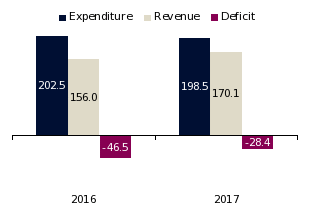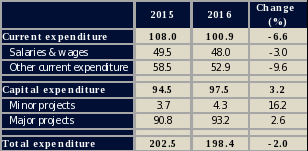On December 15, Qatar’s Ministry of Finance (MoF) released its budget for 2017 in which it outlined its fiscal outlook for the coming year. The budget committed to reducing Qatar’s planned deficit by 38.9% from QAR46.5bn in 2016 to QAR28.4bn in 2017. The deficit is expected to decline due to a pickup in government revenues and continued rationalisation of current expenditure. However, capital spending is expected to increase in 2017 to support Qatar’s preparation for the World Cup and economic diversification objectives. The government has also outlined in the budget an intent to further accelerate investment and infrastructure spending in the coming years.
Qatar budget fiscal outlook
(bn QAR)

Sources: Qatar Ministry of Finance and QNB Economics
The authorities announced that revenues are expected to increase by 9.0% in 2017 compared to last year’s budget. The revenue projection is based on an oil price assumption of USD45 per barrel. On the expenditure side, the budget predicts a slight decline of 2.0%relative to the 2016 budget but the composition of spending is expected to change. Current expenditure, which includes salaries and wages, will decline by 6.6% in 2017 as the government continues to increase the efficiency of public spending and benefits from cost savings from the consolidation of ministries in previous years.
Current expenditure’s share is expected to fall from 53.3% of total spending in 2016 to 50.8% in 2017. In contrast, capital spending is planned to increase by 3.2% with its share of total spending rising from 46.7% in 2016 to 49.1% in 2017. Capital project spending will be targeted at transportation and infrastructure (21.2% of total spending), health (12.3%) and education (10.4%).
The MoF also signalled an intention to boost future capital spending, announcing that the government will agree to QAR46.1bn worth of new contracts in 2017, adding to a stock of QAR374bn non-hydrocarbon sector projects already initiated by the public sector. Moreover, these agreements will be also be focused on infrastructure and transportation and World Cup related projects.
Budget expenditure allocation
(bn QAR; unless otherwise noted)

Sources: Qatar Ministry of Finance and QNB Economics
The government also announced it will continue to finance the deficit through domestic and external debt instruments and not draw down on accumulated reserves. In 2016, Qatar secured a USD5.5bn syndicated loan and successfully issued USD9.0bn of bonds. Its reserve position remains strong, with accumulated current account surpluses of USD323bn at the end of 2015, which accounted for 193.6% of GDP.
In conclusion, Qatar’s budget outlines a clear intent to reduce the government deficit while also supporting growth through higher capital spending. The commitment to ramp up future capital spending indicates that public investment will continue to be the main driver of economic growth in the coming years. But the investment programme will also support the drivers of Qatar’s long-term growth, evidenced by the sizeable investments in the education and health sectors. These investments will foster human capital accumulation, population growth and private sector development in line with Qatar’s National Vision 2030.
